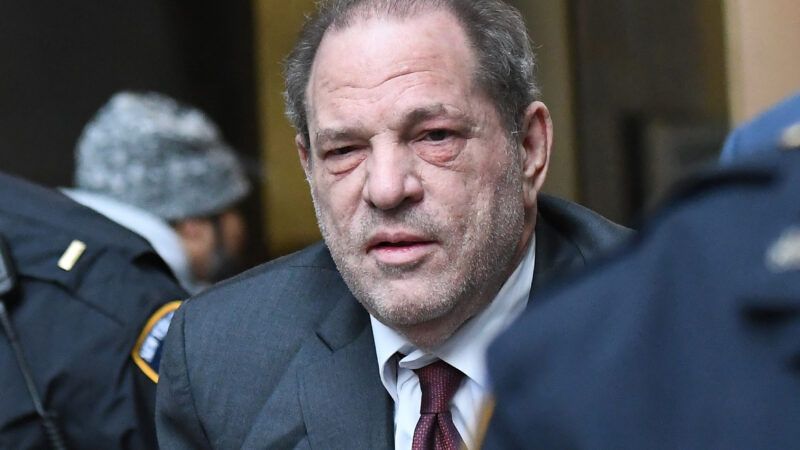The Court Was Right To Overturn Harvey Weinstein's Rape Conviction
The ruling has nothing to do with #MeToo. It is about ensuring a fair trial—a principle that applies no matter how unsympathetic the defendant.

There are few high-profile criminal defendants as unsympathetic as Harvey Weinstein, the erstwhile Hollywood mogul whose alleged sexual misconduct against women was so pervasive that it was reportedly an open secret in celebrity circles. So the New York Court of Appeals' decision yesterday overturning his sex crime convictions in that state may have seemed to represent something deeper: backlash to the #MeToo movement, how powerful men are held to a less robust standard of justice, how we don't take survivors of sexual assault seriously.
In reality, it was about none of those things. It was actually about a criminal defendant receiving a fair trial—an uncontroversial premise in most cases. This case admittedly isn't like most cases. The premise should still be uncontroversial.
In February 2020, Weinstein was convicted of first-degree criminal sexual assault and third-degree rape after three women testified about nonconsensual encounters with him. But during his trial, the prosecution convinced the judge to allow three additional witnesses to testify about their experiences with Weinstein as well, despite that their testimony related to alleged misconduct for which Weinstein wasn't charged.
That was a fatal error, said the New York Court of Appeals.
"We conclude that the trial court erroneously admitted testimony of uncharged, alleged prior sexual acts against persons other than the complainants of the underlying crimes," wrote Judge Jenny Rivera for the 4–3 majority ruling. "The only evidence against defendant was the complainants' testimony, and the result of the court's rulings, on the one hand, was to bolster their credibility and diminish defendant's character before the jury. On the other hand, the threat of a cross-examination highlighting these untested allegations undermined defendant's right to testify. The remedy for these egregious errors is a new trial."
At the heart of that decision is People v. Molineux, a landmark New York ruling that significantly hamstrings the government's ability to introduce evidence of uncharged conduct, as it could unfairly prejudice a jury against the defendant. According to that 1901 decision, the Molineux rule "is the product of that same humane and enlightened public spirit which, speaking through our common law, has decreed that every person charged with the commission of a crime shall be protected by the presumption of innocence until [they have] been proven guilty beyond a reasonable doubt."
There are ways to dance around that rule, but they're limited. Most notably, Molineux begins with somewhat of a litmus test: Does the testimony merely establish propensity for criminality? If the answer to that is "yes," then that testimony must be excluded. And in Weinstein's case, the appeals court ruled, the answer to that question was "yes."
The court's decision doesn't mean Weinstein is innocent. It means he deserves a fair proceeding. And he will still await that new proceeding behind bars, as he was also sentenced to 16 years in prison by a California court after a jury found him guilty of three sex crimes there.
In dissent, Judge Madeline Singas said the testimony detailing uncharged conduct rose above mere propensity in that it helped rebut longstanding myths about rape victims that could have tainted a jury's evaluation. There are indeed many such myths, including the notion that credible victims immediately report attacks and sever any relationship with their attackers.
"But justice for sexual assault victims is not incompatible with well-established rules of evidence designed to ensure that criminal convictions result only from the illegal conduct charged," countered Rivera. "Indeed, just as rape myths may impact the trier of fact's deliberative process, propensity evidence has a bias-inducing effect on jurors and tends to undermine the truth-seeking function of trials."
The #MeToo movement was in many ways a necessary corrective to years of unacceptable behavior by powerful men, including Weinstein, who, in some sense, were genuinely above the law. The solution, however, is not to make them beneath it. "Under our system of justice, the accused has a right to be held to account only for the crime charged," wrote Rivera. "It is our solemn duty to diligently guard these rights regardless of the crime charged, the reputation of the accused, or the pressure to convict."


Show Comments (30)